Al Suyuti mentions the concepts of the Abrogation
he says: "And the third example is that what was abrogated in recitation whilst the ruling remained" and
then he quotes the narration of Aisha RA
"200 verses of Surah al Ahzab were recited during the lifetime of the Prophet Muhammad ﷺ, so when Uthman
standarised the masahif he could not (write more) then what it is now.
Its already evident from the narration of Aisha that "he could not" means that it was abrogated in recitation.
However in the footnote it is stated that the Sanad is weak due to ibn lahia
Long Link
Authentic or not, the narration from Aisha is clear that it was abrogated in recitation.
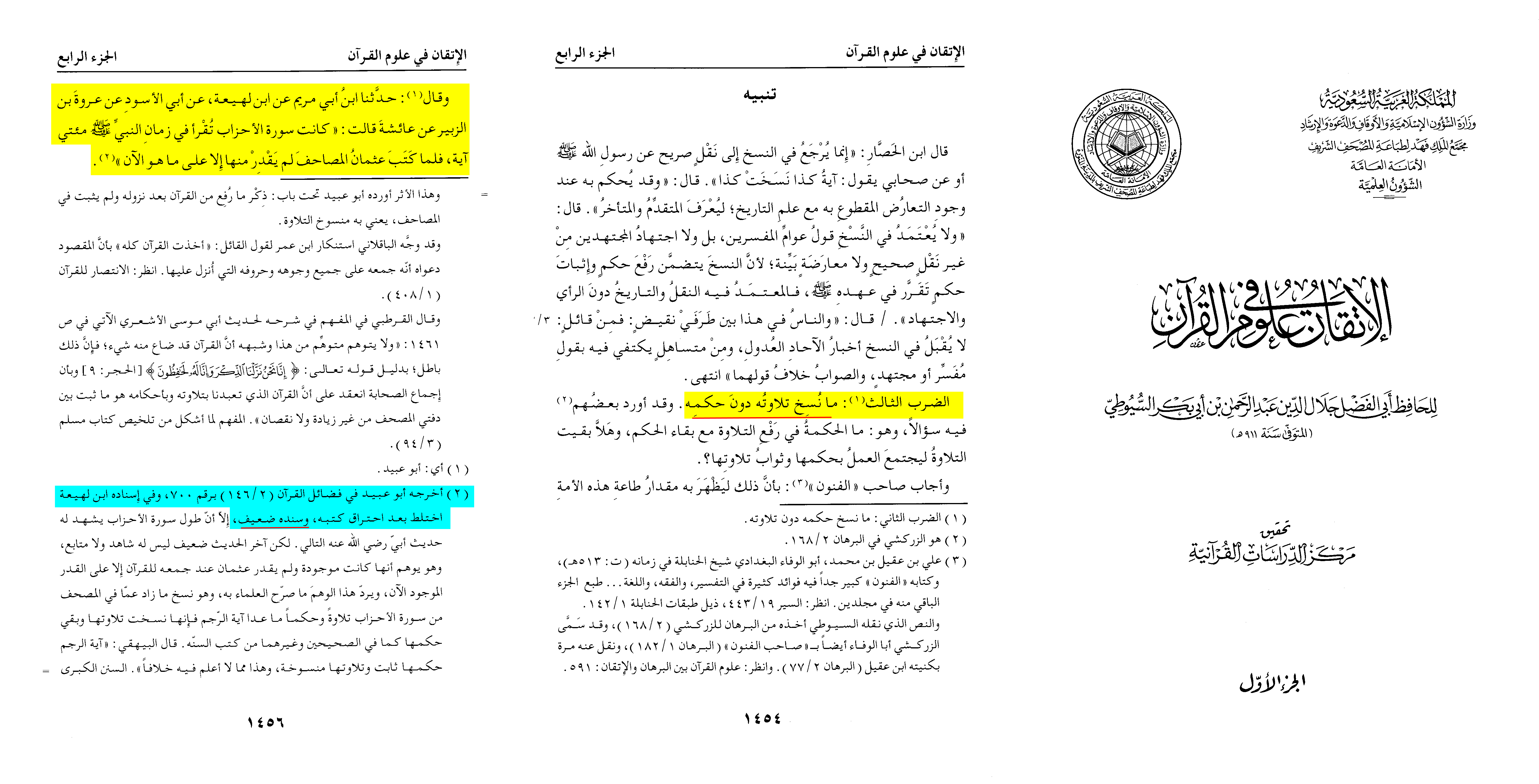 Muhammad Bin tahur al Ashur in his books Tafseer al Tahreer wal tanweer
"From zirr, ubay asked me, how many verses do u count in surah al ahzab he (Zirr) said: 73 verses, Ubay
replied saying it used to be similar in length to Surah al Baqara and he recited the stoning verse and says
afterwards "IT WAS RAISED AMONG WHAT WAS RAISED" " Muhammad bin Tahur al ashur says raised meaning "abrogated"
And thr narration of Abu Ubayd al Qasim bin salam, and ibn Al Anbari with a chain from Aisha where she said:
"200 verses of Surah al Ahzab were recited during the lifetime of the Prophet Muhammad ﷺ, so when Uthman
standarised the masahif he could not (write more) then what it is now"
BOTH REPORTS ARE WEAK IN CHAIN
even if its not weak, both narrations illustrate abrogation.
As Muhammad bin Tahur says at the bottom of the page
"The report of Aisha is weaker in chain (than ubays) and if its authentic, then she was talking about abrogation
that occured in Surah al Ahzab"
Even if its not weak, both narrations illustrate abrogation
Aisha= "could not write more"
Ubay= "raised what was raised"
Muhammad Bin tahur al Ashur in his books Tafseer al Tahreer wal tanweer
"From zirr, ubay asked me, how many verses do u count in surah al ahzab he (Zirr) said: 73 verses, Ubay
replied saying it used to be similar in length to Surah al Baqara and he recited the stoning verse and says
afterwards "IT WAS RAISED AMONG WHAT WAS RAISED" " Muhammad bin Tahur al ashur says raised meaning "abrogated"
And thr narration of Abu Ubayd al Qasim bin salam, and ibn Al Anbari with a chain from Aisha where she said:
"200 verses of Surah al Ahzab were recited during the lifetime of the Prophet Muhammad ﷺ, so when Uthman
standarised the masahif he could not (write more) then what it is now"
BOTH REPORTS ARE WEAK IN CHAIN
even if its not weak, both narrations illustrate abrogation.
As Muhammad bin Tahur says at the bottom of the page
"The report of Aisha is weaker in chain (than ubays) and if its authentic, then she was talking about abrogation
that occured in Surah al Ahzab"
Even if its not weak, both narrations illustrate abrogation
Aisha= "could not write more"
Ubay= "raised what was raised"
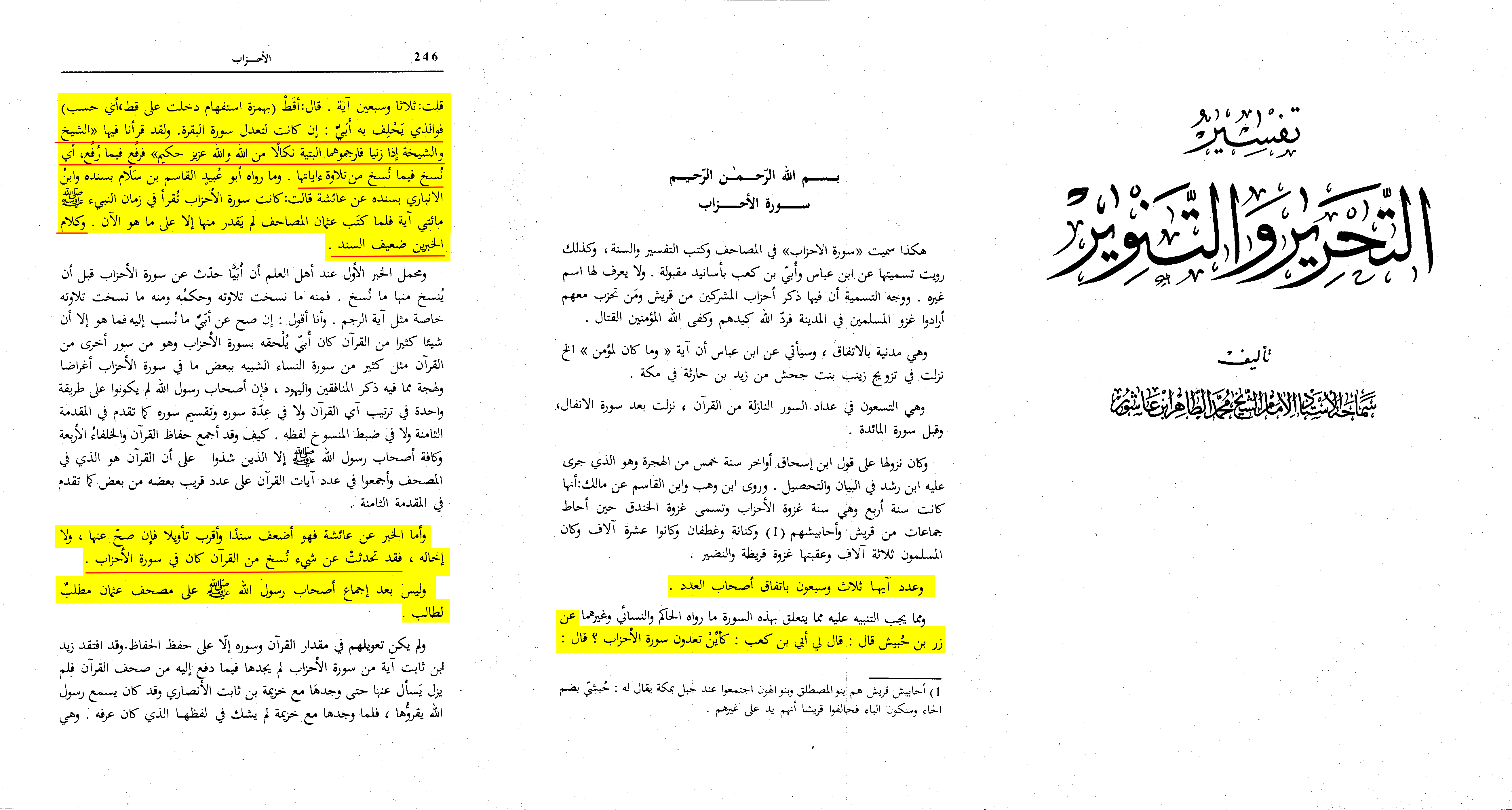 Imam Ahmad in his Musnad
narration #21206
Ubay asked zirr
"How many (ayat) do you recite in surah al ahzab, zirr said 70 (something) verses, Ubay replied:
I recited it with the prophet and it was similar to surah al baqara or larger than it and it had in Ayat al Rajm"
#21207
"From zirr, ubay asked me, how many verses do u count in surah al ahzab he (Zirr) said: 73 verses,
Ubay replied saying it used to be similar in length to Surah al Baqara and we recited in the stoning verse"
ubay then quotes it
First narration is weak due to Yazeed bin abi ziyad.
Ibn Main said: he is not needed
Ibn al mubarak said: throw him away
shuba said: he was honorouable
For more information on why yazeed bin ziyad is weak
Long Link
Second narration is weak due to Asim bin abi al najoud due to his weak memory in hadith
There is major ikhtilaf on Asim
You have others who authenticed this narration with him in the sanad and other who didnt.
For more information on Asim
Long Link
In all cases there are other narrations where it states "RAISED AMONG WHAT WAS RAISED" meaning it still alludes to abrogation.In all cases
there are other narrations where it states "RAISED AMONG WHAT WAS RAISED" meaning it still alludes to abrogation.
Imam Ahmad in his Musnad
narration #21206
Ubay asked zirr
"How many (ayat) do you recite in surah al ahzab, zirr said 70 (something) verses, Ubay replied:
I recited it with the prophet and it was similar to surah al baqara or larger than it and it had in Ayat al Rajm"
#21207
"From zirr, ubay asked me, how many verses do u count in surah al ahzab he (Zirr) said: 73 verses,
Ubay replied saying it used to be similar in length to Surah al Baqara and we recited in the stoning verse"
ubay then quotes it
First narration is weak due to Yazeed bin abi ziyad.
Ibn Main said: he is not needed
Ibn al mubarak said: throw him away
shuba said: he was honorouable
For more information on why yazeed bin ziyad is weak
Long Link
Second narration is weak due to Asim bin abi al najoud due to his weak memory in hadith
There is major ikhtilaf on Asim
You have others who authenticed this narration with him in the sanad and other who didnt.
For more information on Asim
Long Link
In all cases there are other narrations where it states "RAISED AMONG WHAT WAS RAISED" meaning it still alludes to abrogation.In all cases
there are other narrations where it states "RAISED AMONG WHAT WAS RAISED" meaning it still alludes to abrogation.
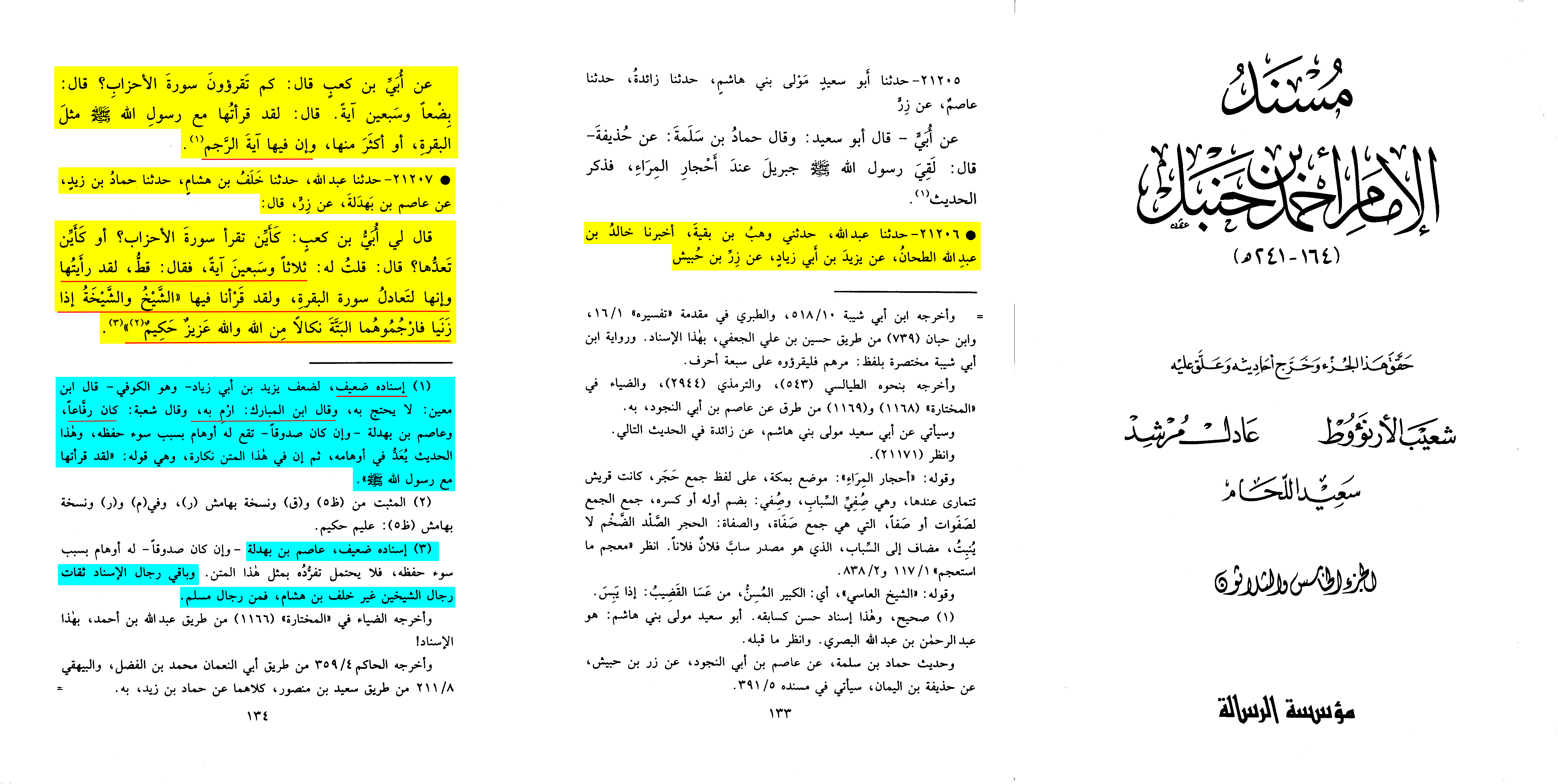 You have others who authenticed this narration with him in the sanad and other who didnt.
Abd al malik Bin Abdullah Bin Duhaysh authenticates this narration which is the same one in Musnad Ahmad
So there is ikhtilaf on Asim.
Either way
1) If Asim is thiqah it still aludes to abrogtaion as in Musnad Abi dawud al Tailisi the narration states
"RAISED AMONG WHAT WAS RAISED"
2) If hes not reliable then the 200 verses never existed.
As well as Ubays way of speaking. He speaks in the past tense signifying that during his lifetime the verses
stopped being recited by the muslims, including the companions of the Prophet.
if hes not reliable then the 200 verses never existed.
Either choice works in our favour.
You have others who authenticed this narration with him in the sanad and other who didnt.
Abd al malik Bin Abdullah Bin Duhaysh authenticates this narration which is the same one in Musnad Ahmad
So there is ikhtilaf on Asim.
Either way
1) If Asim is thiqah it still aludes to abrogtaion as in Musnad Abi dawud al Tailisi the narration states
"RAISED AMONG WHAT WAS RAISED"
2) If hes not reliable then the 200 verses never existed.
As well as Ubays way of speaking. He speaks in the past tense signifying that during his lifetime the verses
stopped being recited by the muslims, including the companions of the Prophet.
if hes not reliable then the 200 verses never existed.
Either choice works in our favour.
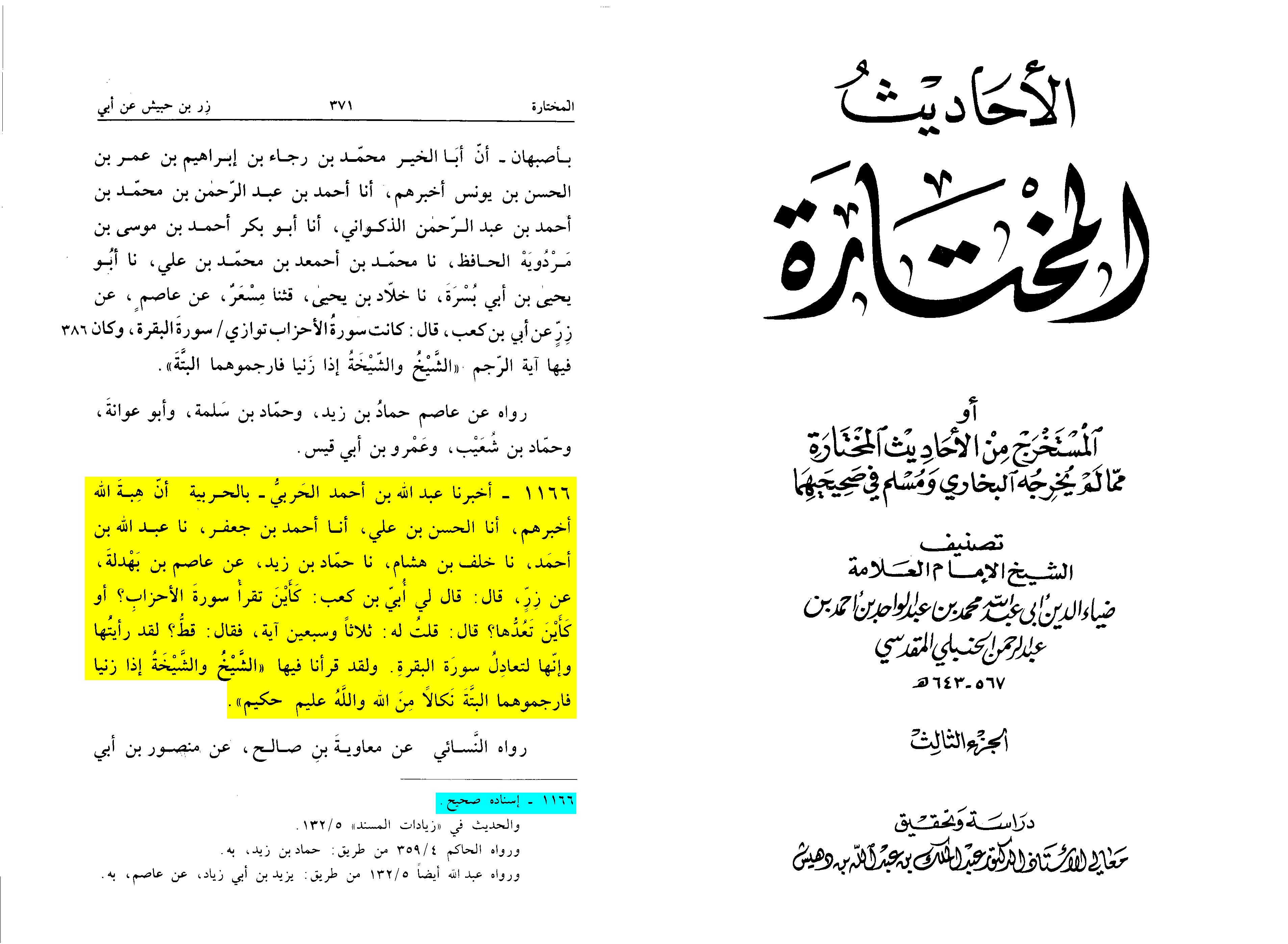 Here is the narration in Musnad Abi Dawud al Tailisi
Narrated by zirr bin hubyash
Ubayy bin Ka’b said to me; “How much of Surah Ahzab do you recite or how much do you count [its verses to be]?”
Zirr said that he replied, “so and so verses" Ubayy said; “It was similar to Surah Baqarah and we used to recite
in it, ‘Whenever an aged man or aged woman commit fornication stone them as a punishment from Allah and his
messenger'" So it was risen among what risen (abrogated verses being raised back to Allah)
Here is the narration in Musnad Abi Dawud al Tailisi
Narrated by zirr bin hubyash
Ubayy bin Ka’b said to me; “How much of Surah Ahzab do you recite or how much do you count [its verses to be]?”
Zirr said that he replied, “so and so verses" Ubayy said; “It was similar to Surah Baqarah and we used to recite
in it, ‘Whenever an aged man or aged woman commit fornication stone them as a punishment from Allah and his
messenger'" So it was risen among what risen (abrogated verses being raised back to Allah)
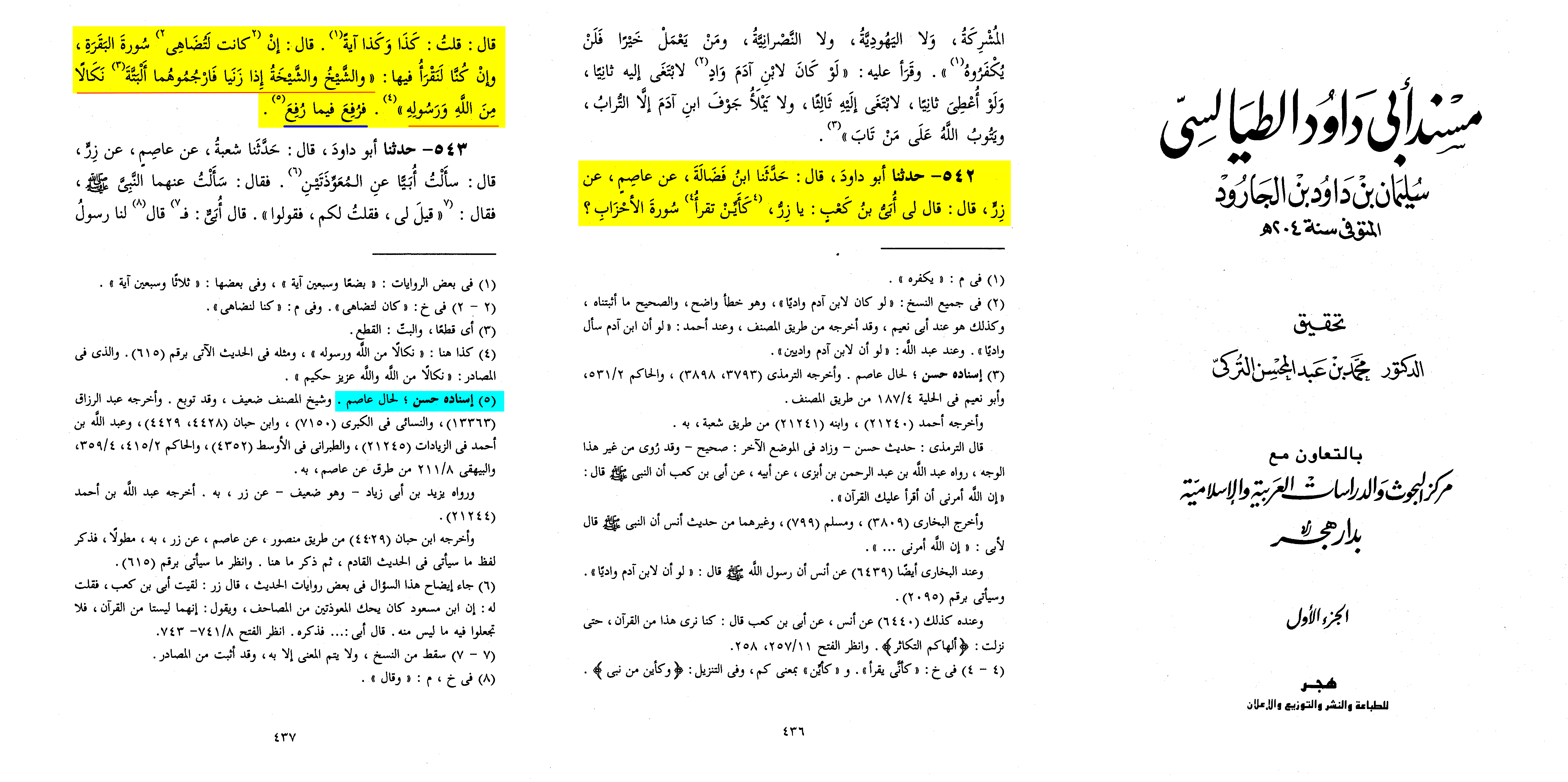 ANOTHER SHUBHA
The narration states the following
Narrated by Abu Nuaym Al Fadl bin dukayn he said: "Yusuf narrated to us from Mujahid, he (Mujahid) said:
"Surah Al Ahzab was similar to Surah al Baqara or longer but on the day (the muslims fought musaylama al kathab,
the battle of yamama) alot of the Quran has gone"
ANOTHER SHUBHA
The narration states the following
Narrated by Abu Nuaym Al Fadl bin dukayn he said: "Yusuf narrated to us from Mujahid, he (Mujahid) said:
"Surah Al Ahzab was similar to Surah al Baqara or longer but on the day (the muslims fought musaylama al kathab,
the battle of yamama) alot of the Quran has gone"
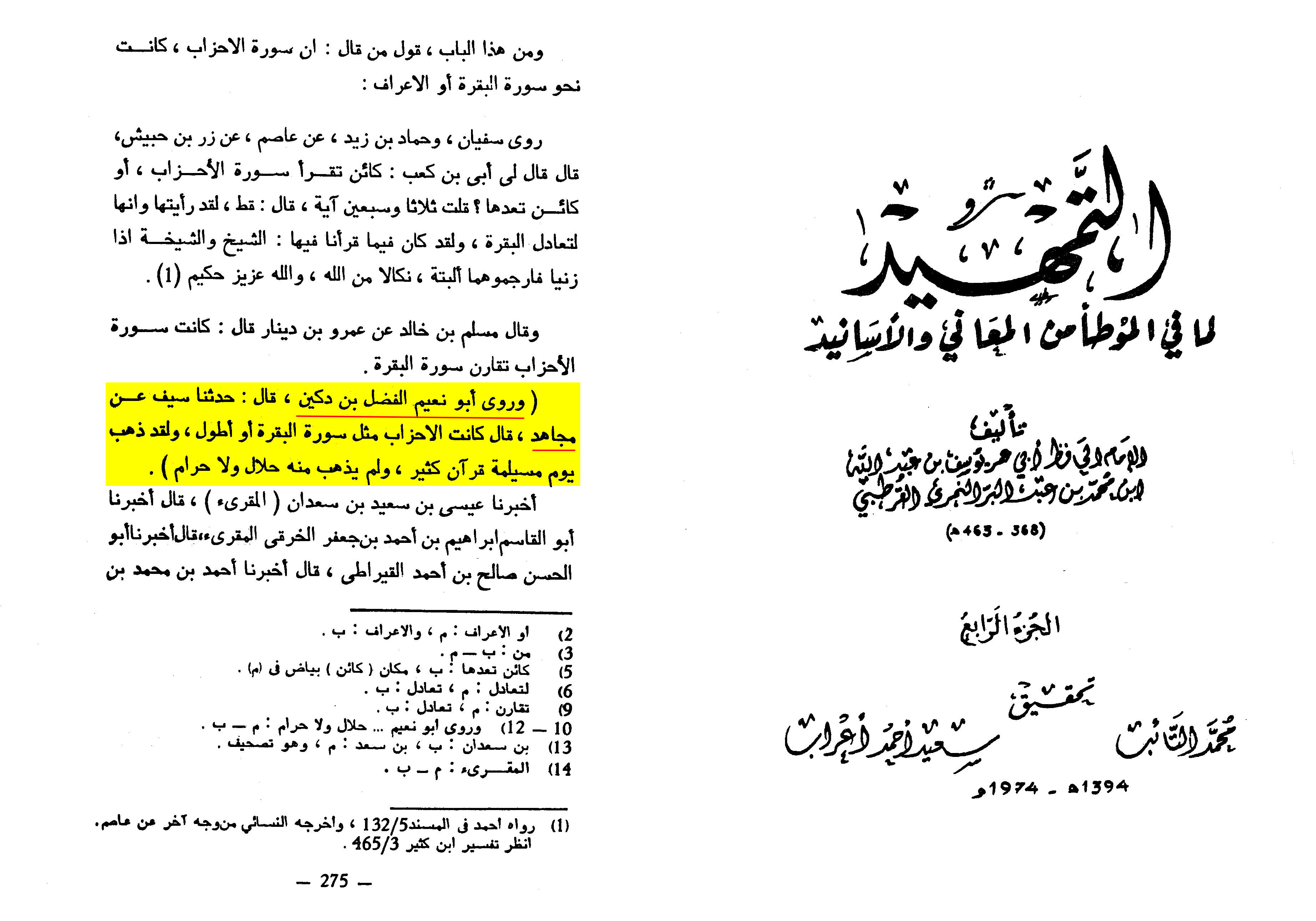 This report is disconnected in 2 ways.
1) Ibn Abdul Bar is narrating from Abu Nuaym.
Abu Nuaym died in 219 AH
Ibn Abdul Bar died in 463 AH at the age of 95.
463-95=368AH
Ibn Abdul Bar was born in 368AH
368AH-219AH=149.
Between Ibn Abdul Bars birth and Abu Nuayms death is 149 years apart.
Hence already making this report weak.
The 2nd way its diconnected
Mujahid is narrating the event of Yamama.
Mujahid was born in either 18AH, or 19AH, 20AH due to the fact he died at the age of 83 at the year 101AH,
102AH, or 103AH
Battle of Yamama took place at 11AH
In conclusion he never witnessed the event and never told us where he got his information.
1st way
This report is disconnected in 2 ways.
1) Ibn Abdul Bar is narrating from Abu Nuaym.
Abu Nuaym died in 219 AH
Ibn Abdul Bar died in 463 AH at the age of 95.
463-95=368AH
Ibn Abdul Bar was born in 368AH
368AH-219AH=149.
Between Ibn Abdul Bars birth and Abu Nuayms death is 149 years apart.
Hence already making this report weak.
The 2nd way its diconnected
Mujahid is narrating the event of Yamama.
Mujahid was born in either 18AH, or 19AH, 20AH due to the fact he died at the age of 83 at the year 101AH,
102AH, or 103AH
Battle of Yamama took place at 11AH
In conclusion he never witnessed the event and never told us where he got his information.
1st way
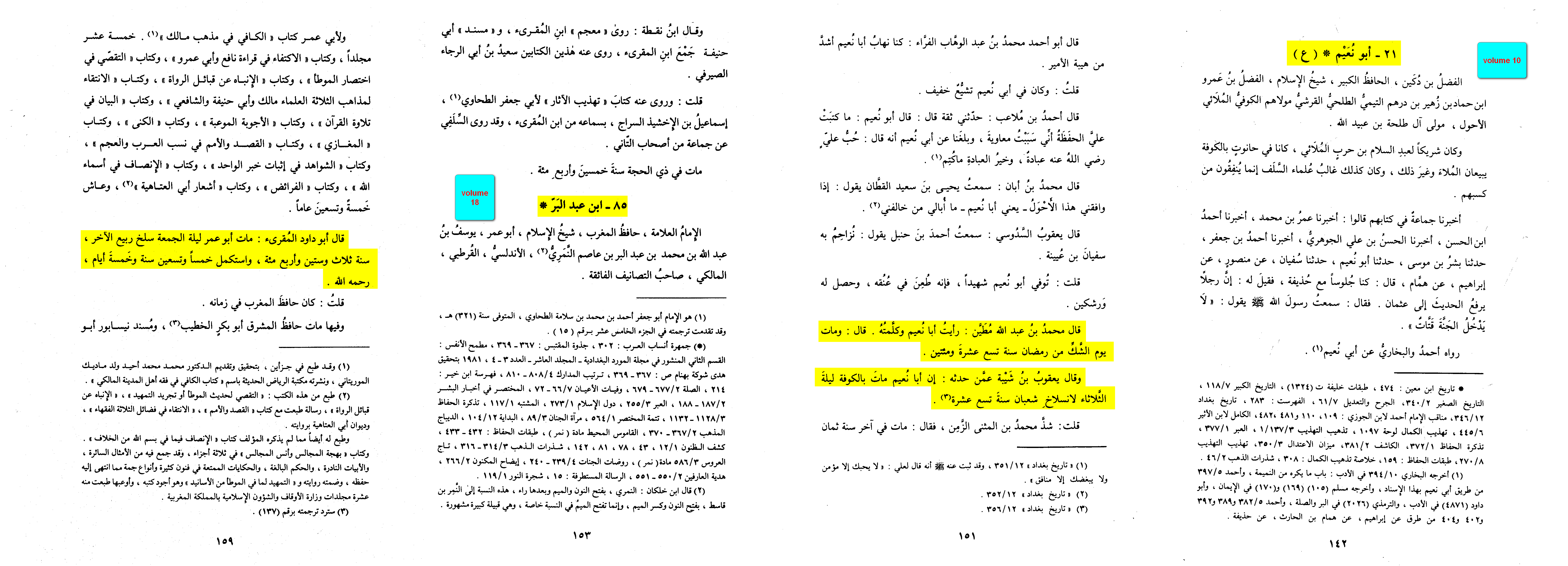 2nd way
2nd way
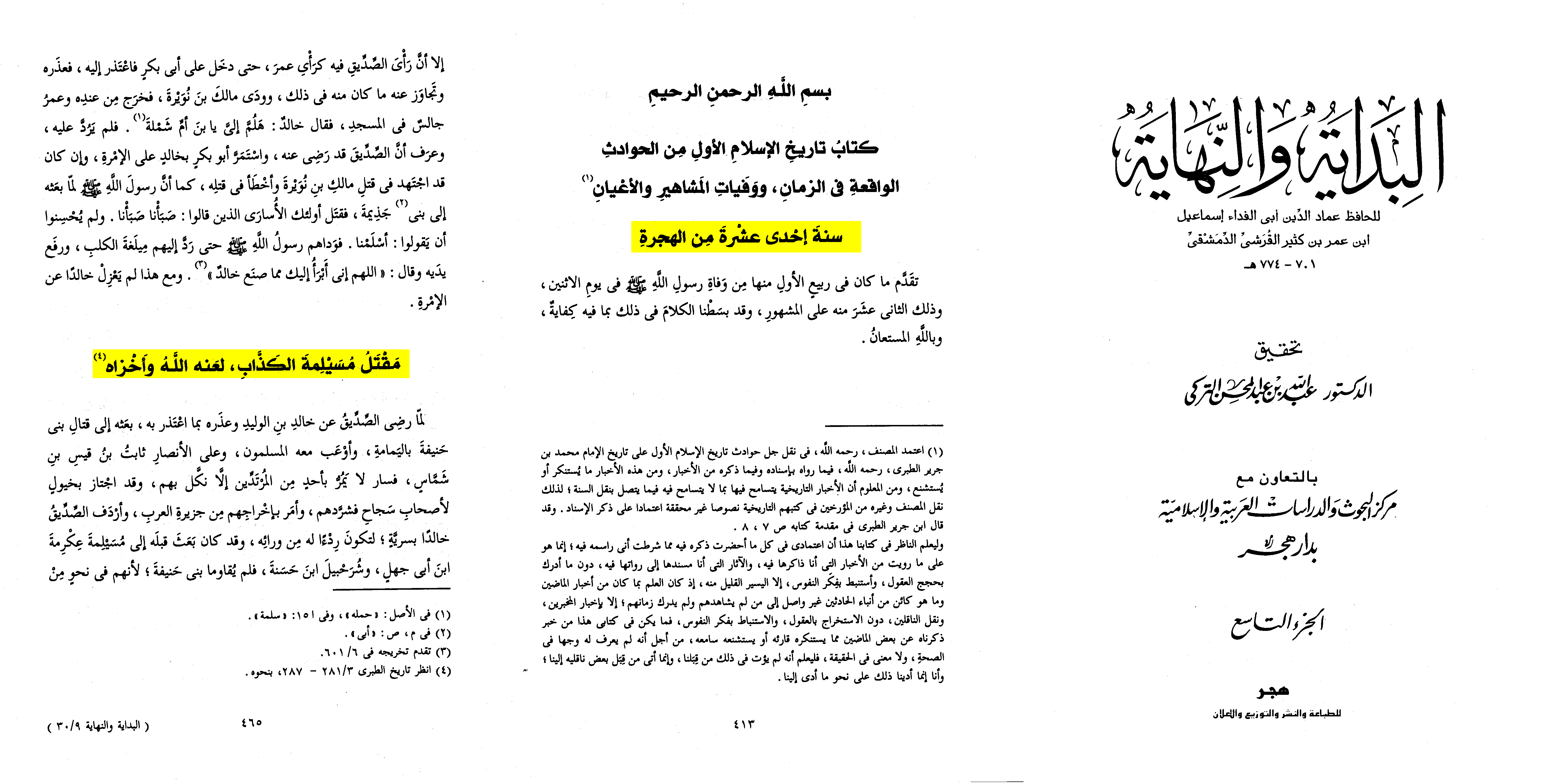 A.H years for Mujahid RA
A.H years for Mujahid RA
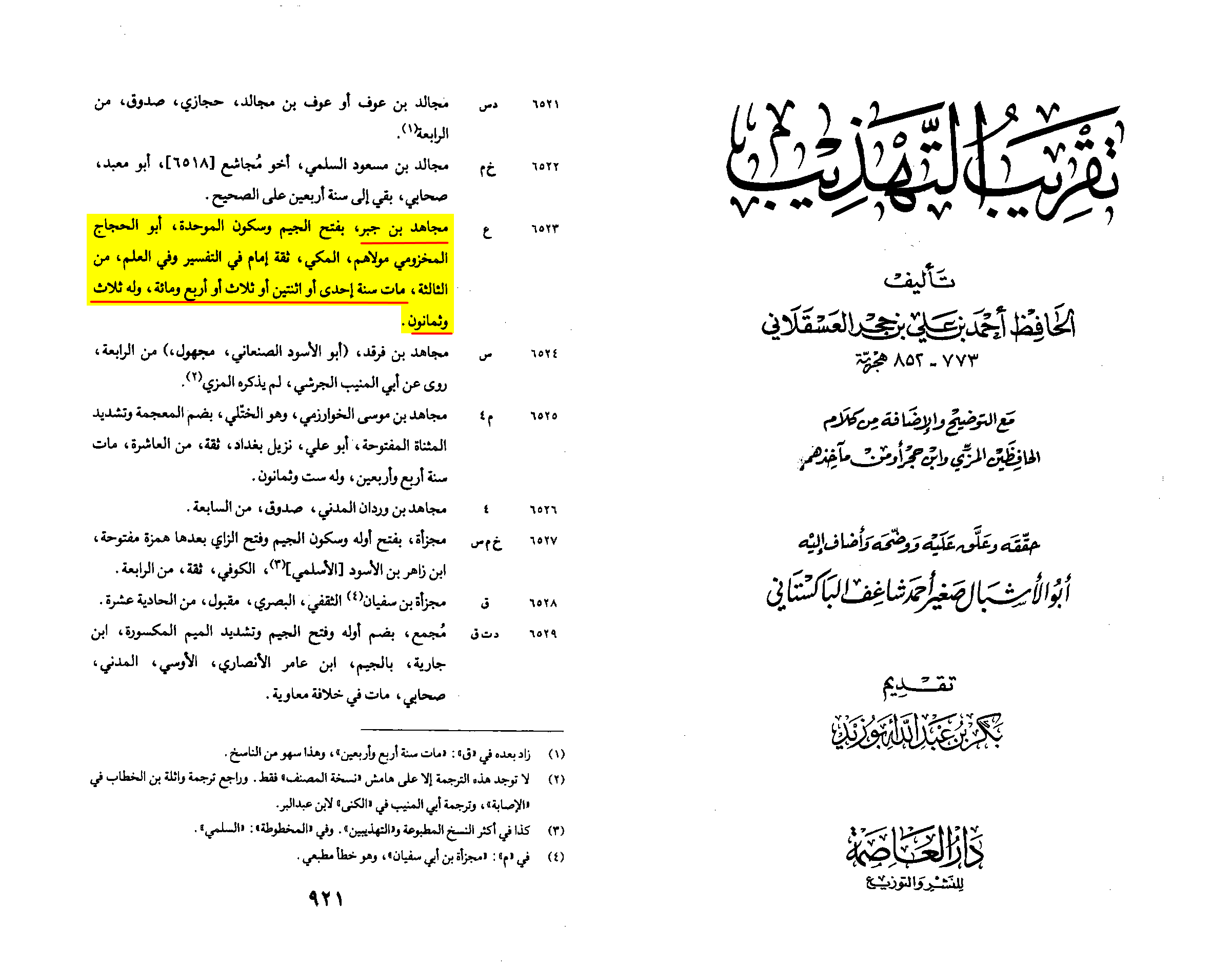 When ibn abdul bar mentioned thisnarration in his books he included under the section of abrogation of the
recitation thats no longer in the Mushaf. He then proceeds to mention the concepts of abrogation and shows
narrations that allude to abrogation and on the next page, he included the narration of Mujahid.
When ibn abdul bar mentioned thisnarration in his books he included under the section of abrogation of the
recitation thats no longer in the Mushaf. He then proceeds to mention the concepts of abrogation and shows
narrations that allude to abrogation and on the next page, he included the narration of Mujahid.
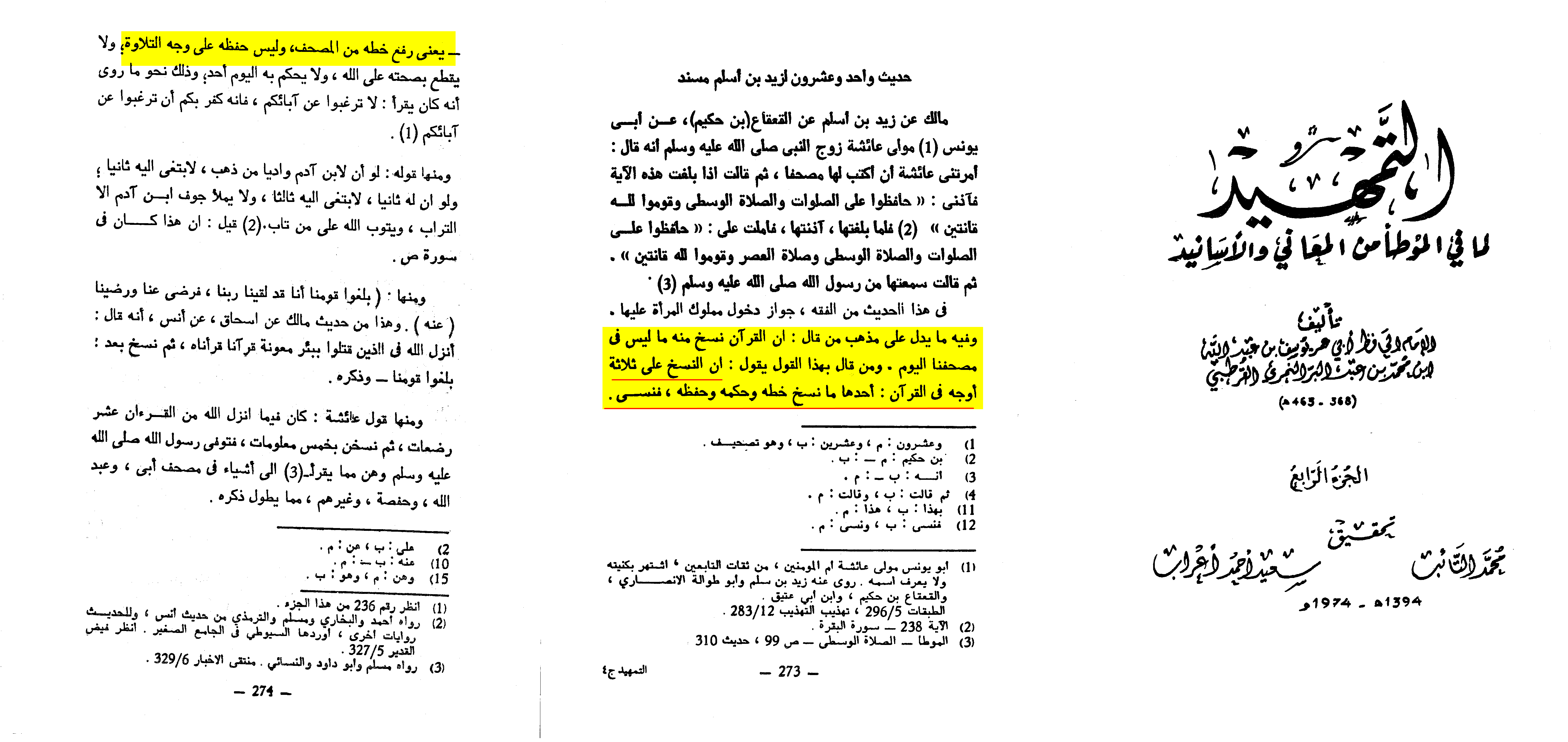 Al Suyuti is using Abu Ubayd as a source for this.
Abu Ubayd put this under the section of "what was raised (abrogated) from the Quran after
its revelation and its not proven in the Masahif
The Muhaqiqs quoted Al Qurtubi in the footnote and he stated:
Ubay was mentioning that this verse was abrogated from the Quran.
Al Suyuti is using Abu Ubayd as a source for this.
Abu Ubayd put this under the section of "what was raised (abrogated) from the Quran after
its revelation and its not proven in the Masahif
The Muhaqiqs quoted Al Qurtubi in the footnote and he stated:
Ubay was mentioning that this verse was abrogated from the Quran.
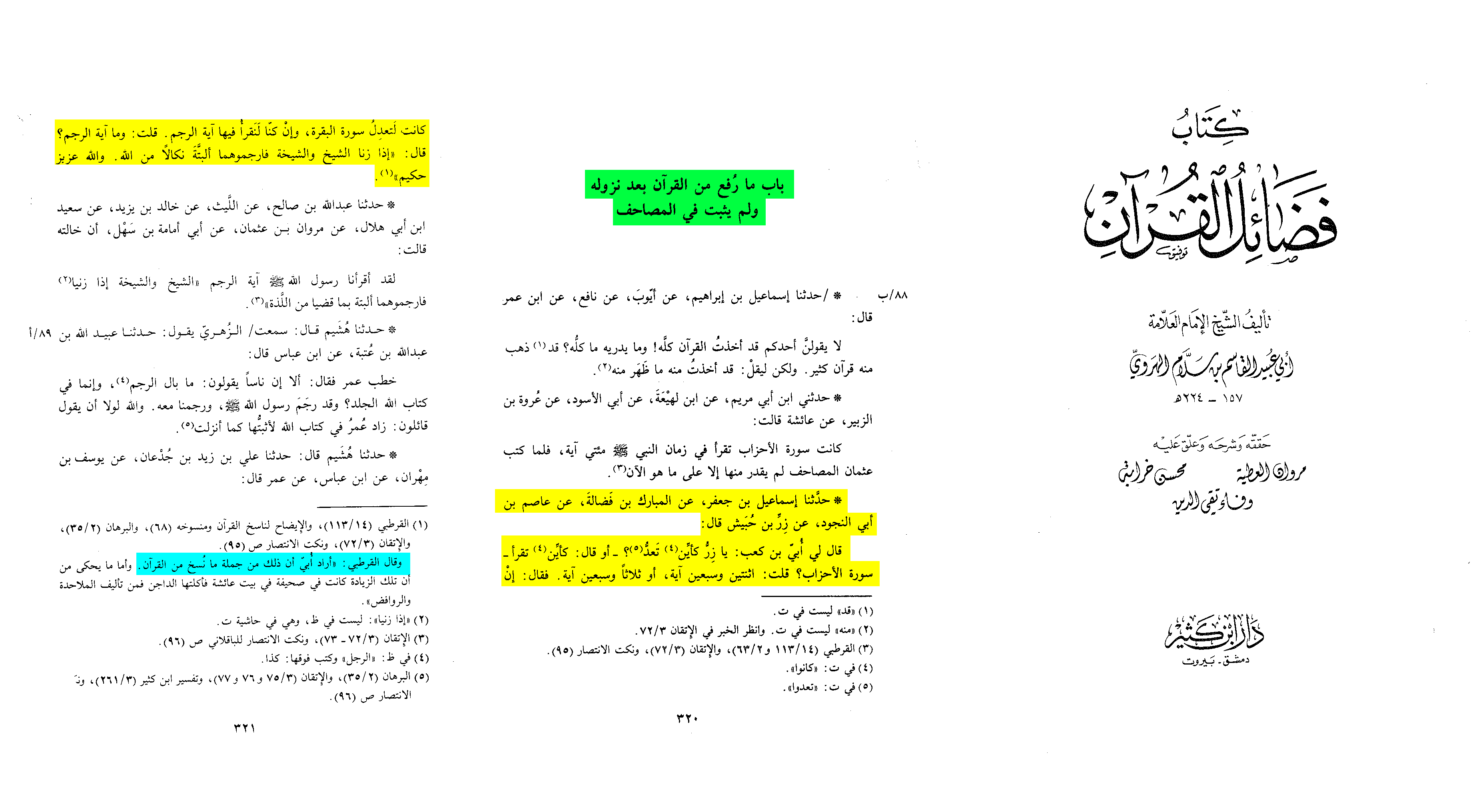 Al Qutubi mentions the narrations and says
"The People of Knowlegde have agreed that Allah had raised (abrogated) verses from Al Ahzab and is no more
(or less) what is between our hands and that the stoning verse was raised in Tilawa.
Al Qurtubi agrees and says its about abrogation as well.
Al Qutubi mentions the narrations and says
"The People of Knowlegde have agreed that Allah had raised (abrogated) verses from Al Ahzab and is no more
(or less) what is between our hands and that the stoning verse was raised in Tilawa.
Al Qurtubi agrees and says its about abrogation as well.
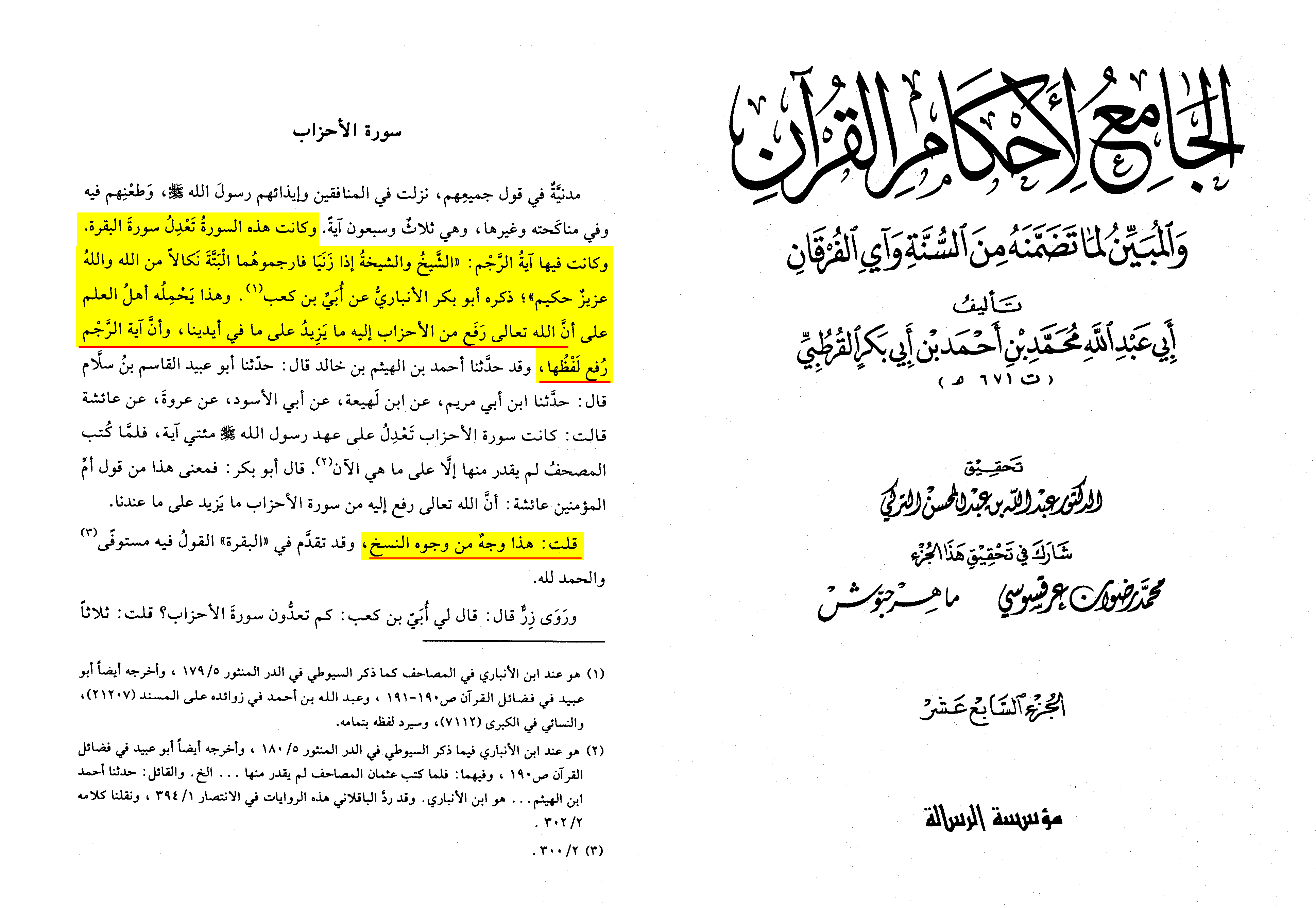 Ibn Kathir mentions the same narration and says that is Hassan sanad and it what was abrogated as well.
Ibn Kathir mentions the same narration and says that is Hassan sanad and it what was abrogated as well.
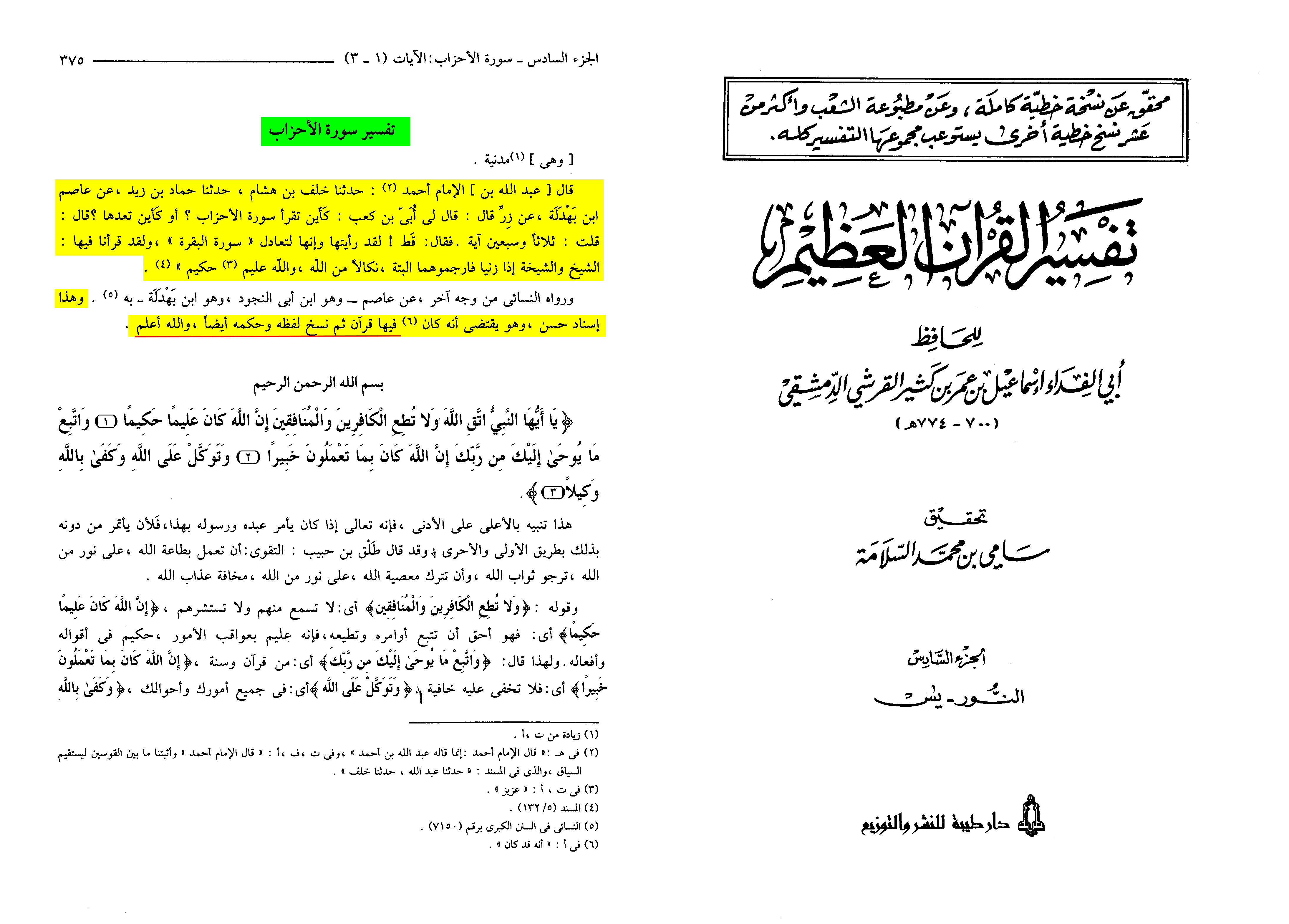 Al Hafidh Al Mustaghfiri mentions the same narration and puts it under the section
"What was raised or abrogated after its revelation and its not in the Masahif"
Al Hafidh Al Mustaghfiri mentions the same narration and puts it under the section
"What was raised or abrogated after its revelation and its not in the Masahif"
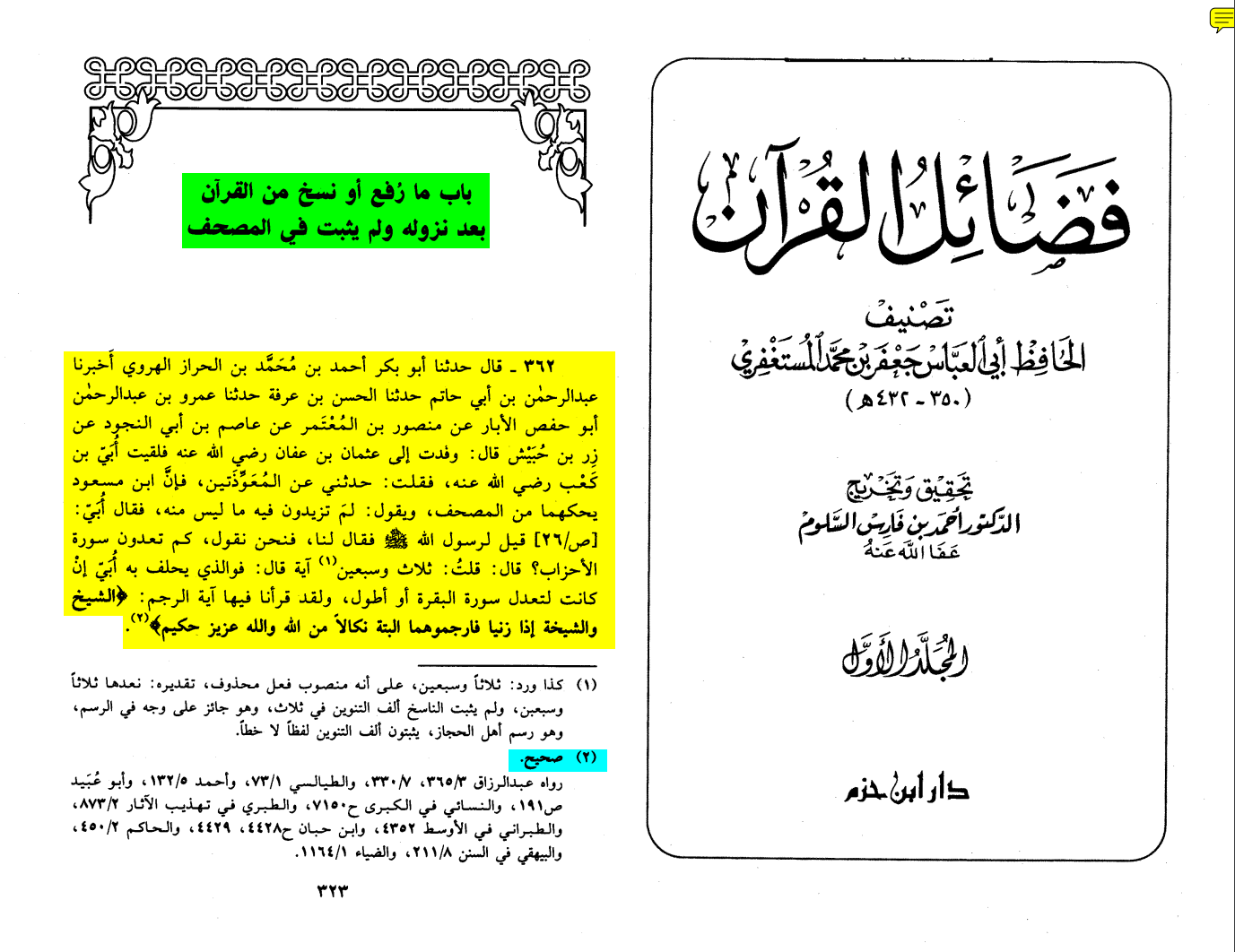 Ibn Hazm also agrees that the ayat were abrogated.
He also shows how there is many turuq from Asim narrating the same thing proving he didnt make a mistake
when narrating this.
Ibn Hazm also agrees that the ayat were abrogated.
He also shows how there is many turuq from Asim narrating the same thing proving he didnt make a mistake
when narrating this.
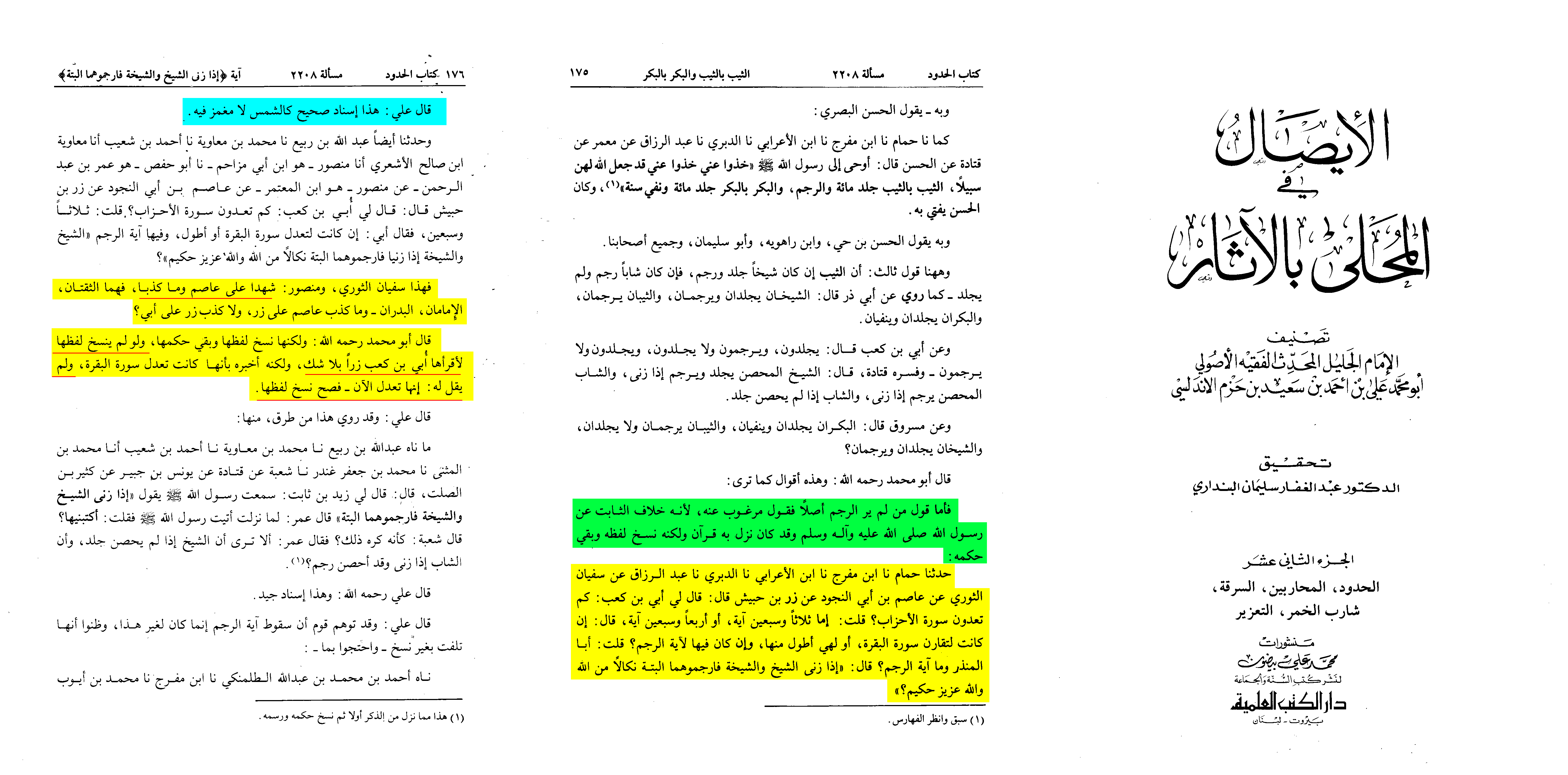 In conclusion, I believe the narration to be authentic due to the many paths from Asim which proves
e didnt make mistake when narrating this.
And even if u dont it dosent matter.
If you believe it is authentic then they were abrogated as shown from the statement of Ubay RA "RAISED
MONG WHAT WAS RAISED" and what the classical scholars have said regarding this.
If you dont believe its authentic then the verses never existed.
This section is very similar to Stoning Verses as a narration can sometimes include the stoning verse
nd surah al ahzab.
Ibn Lahia being weak
imam al tirmidhi said hes weak according to the people of hadtih and quotes yahya ibn saeed weakening him aswell,
nasa'i said hes weak, and al daraqutni also said hes weak
In conclusion, I believe the narration to be authentic due to the many paths from Asim which proves
e didnt make mistake when narrating this.
And even if u dont it dosent matter.
If you believe it is authentic then they were abrogated as shown from the statement of Ubay RA "RAISED
MONG WHAT WAS RAISED" and what the classical scholars have said regarding this.
If you dont believe its authentic then the verses never existed.
This section is very similar to Stoning Verses as a narration can sometimes include the stoning verse
nd surah al ahzab.
Ibn Lahia being weak
imam al tirmidhi said hes weak according to the people of hadtih and quotes yahya ibn saeed weakening him aswell,
nasa'i said hes weak, and al daraqutni also said hes weak
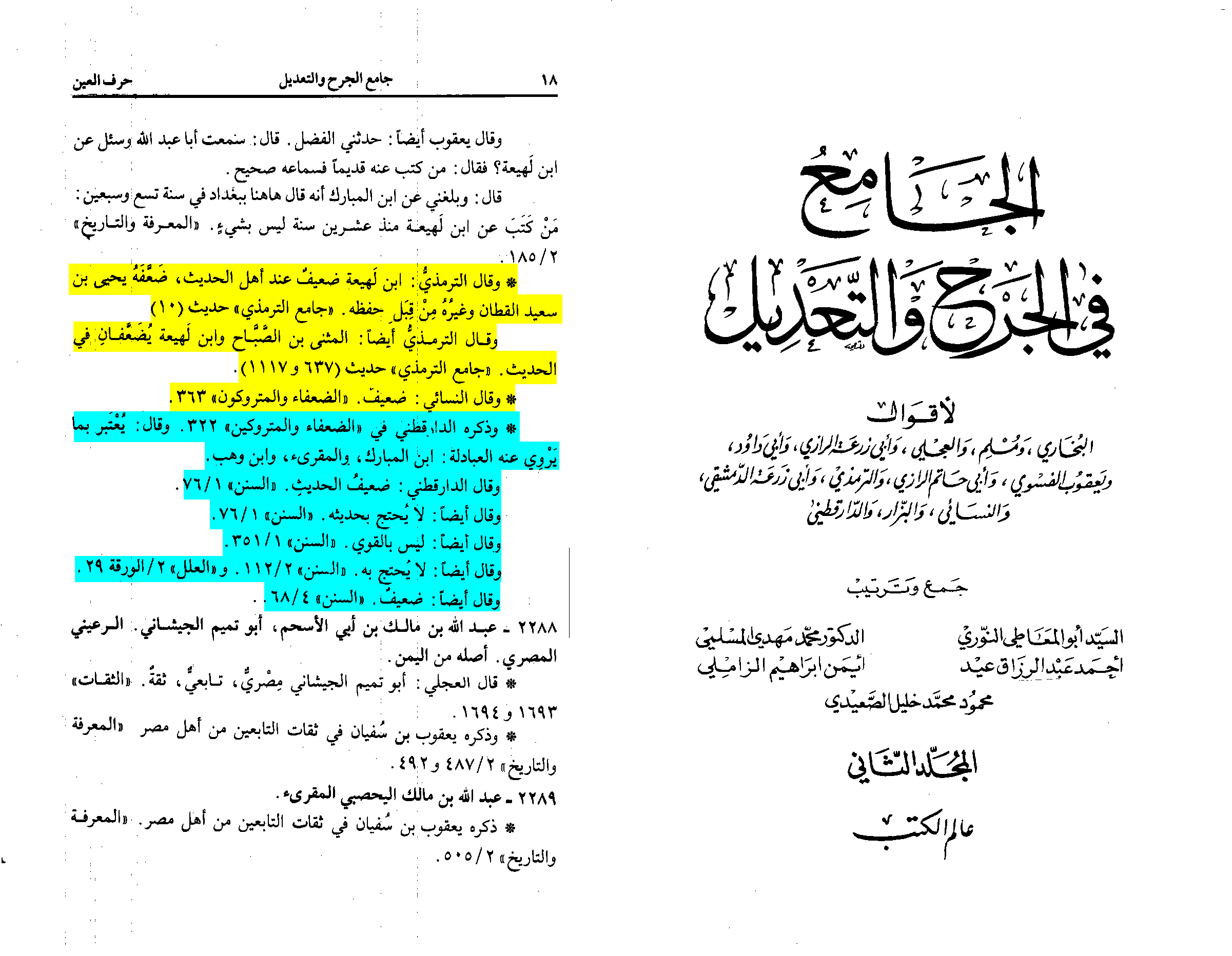 ibn rajab al hanbali also quotes al khatib al baghdadi saying that ibn lahia had many munkar reports due to his leniency
ibn rajab al hanbali also quotes al khatib al baghdadi saying that ibn lahia had many munkar reports due to his leniency
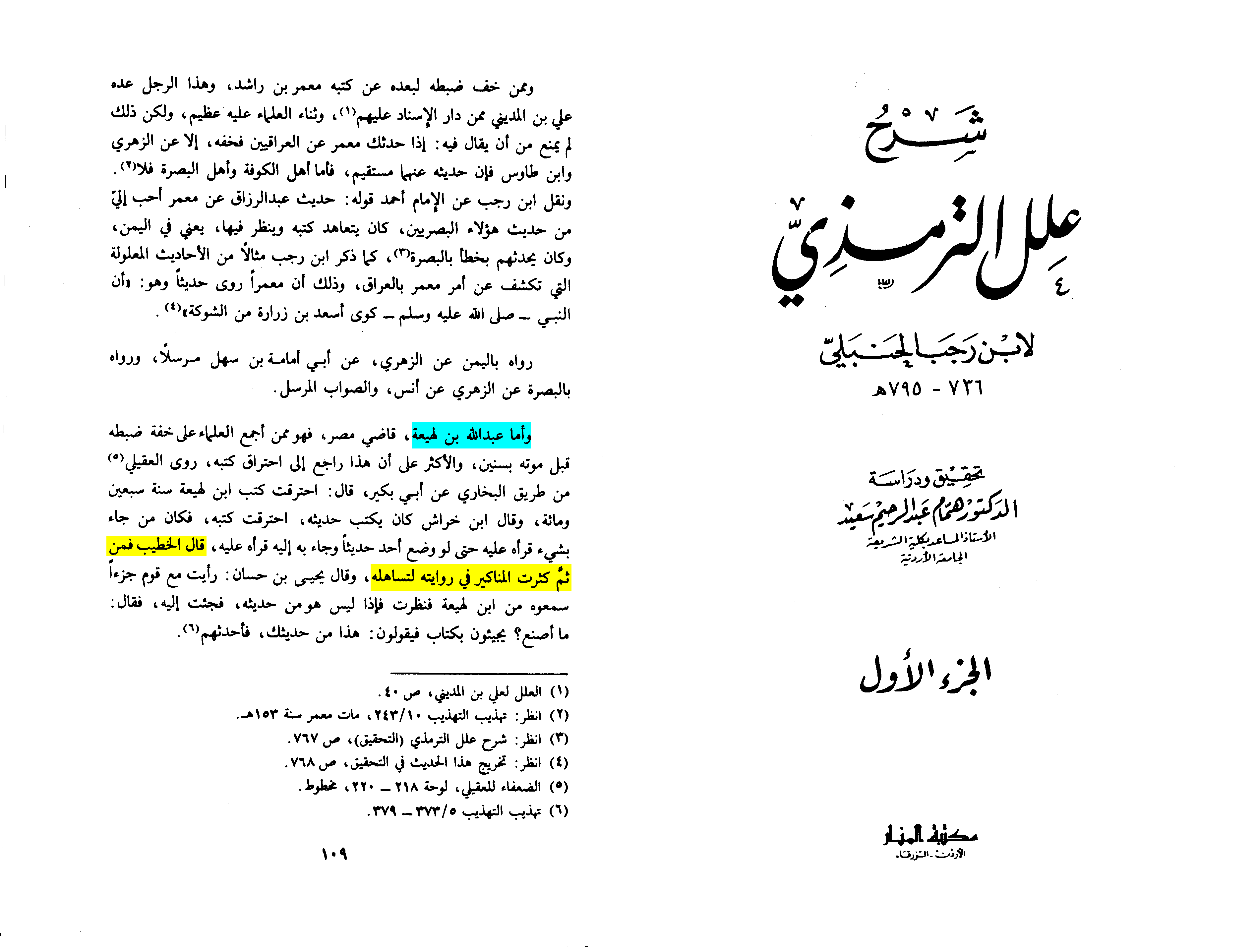 imam al nawawi and al bayhaqi said the scholars of hadith are in agreement that he is weak and not invoked
imam al nawawi and al bayhaqi said the scholars of hadith are in agreement that he is weak and not invoked
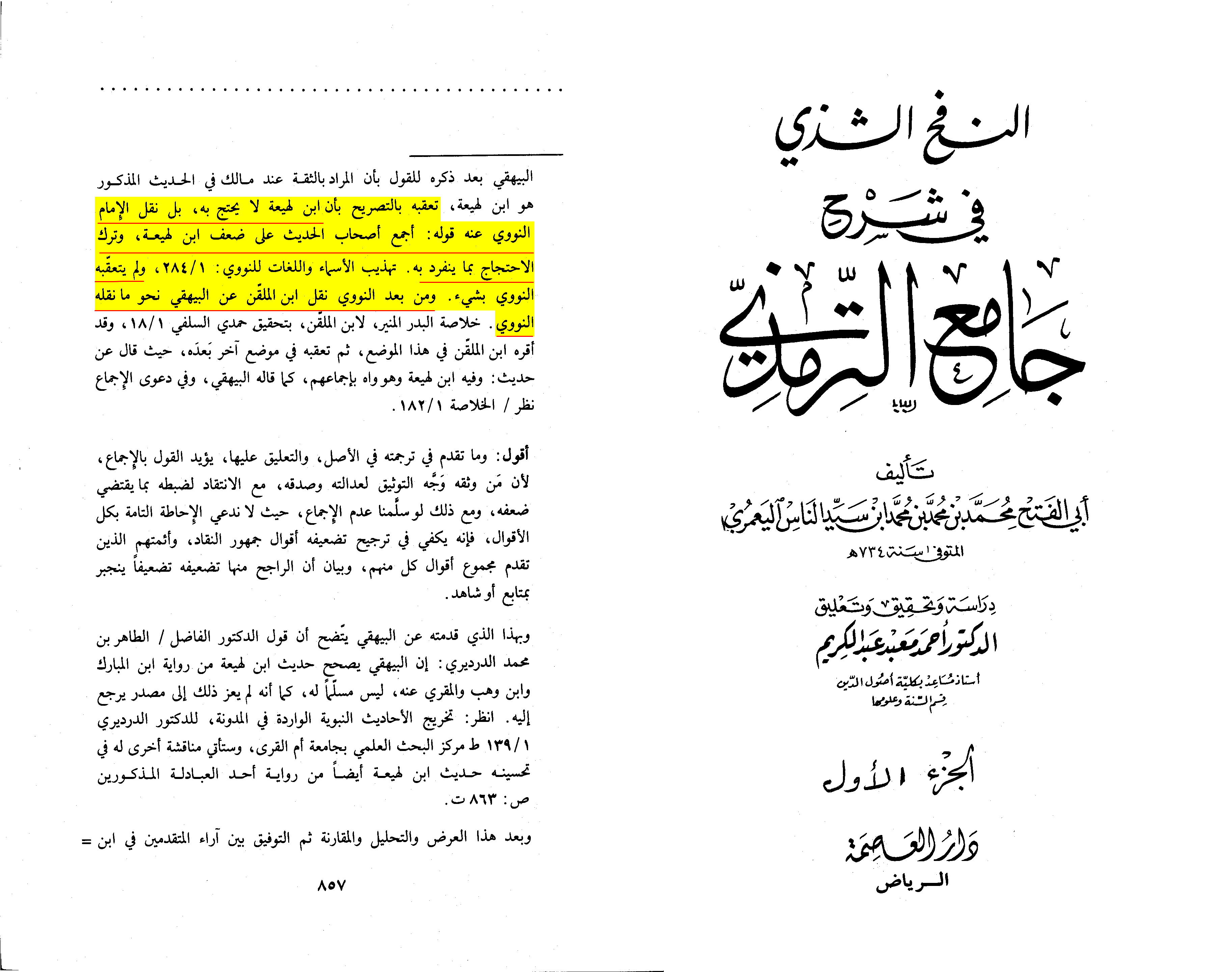 Scholar of Hadith Al-Albani رحمه الله weakens Ibn Lahi’a
Silsilat Al-Ahadith Al-Daifa Vol 10 and page 372
Scholar of Hadith Al-Albani رحمه الله weakens Ibn Lahi’a
Silsilat Al-Ahadith Al-Daifa Vol 10 and page 372
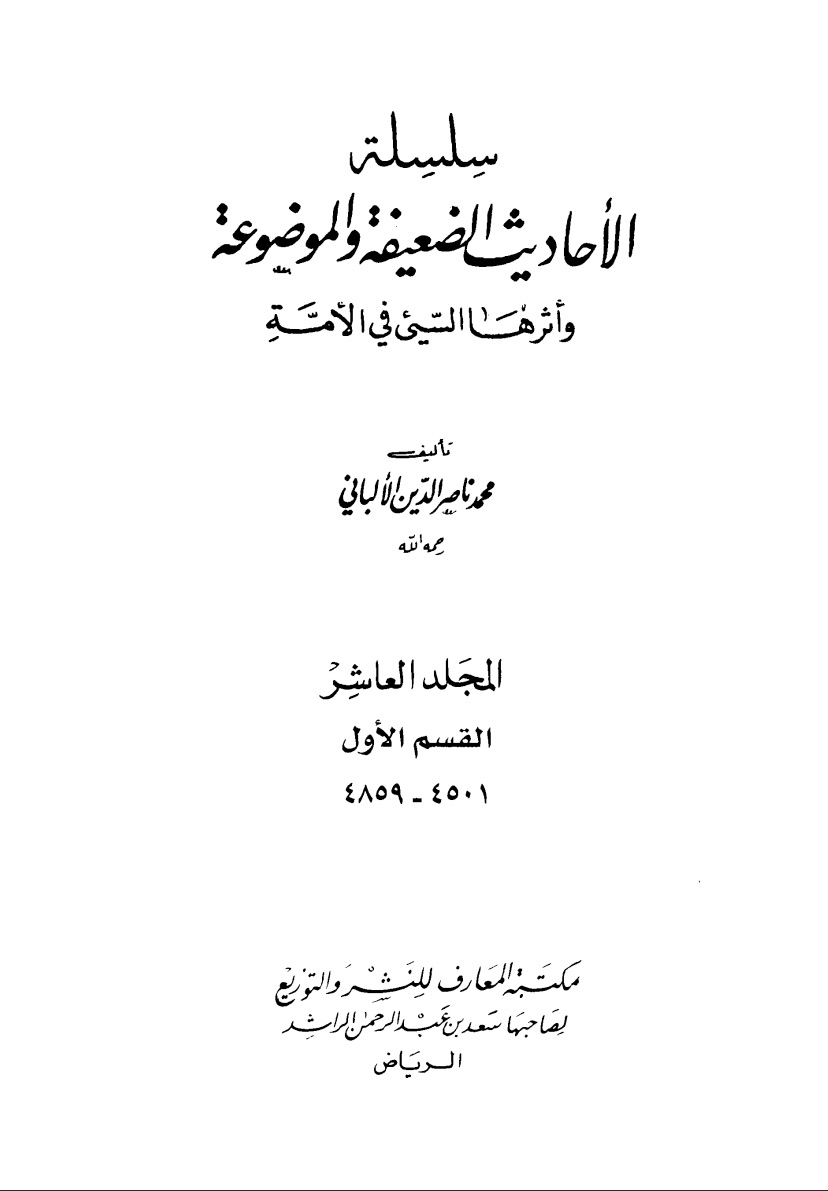
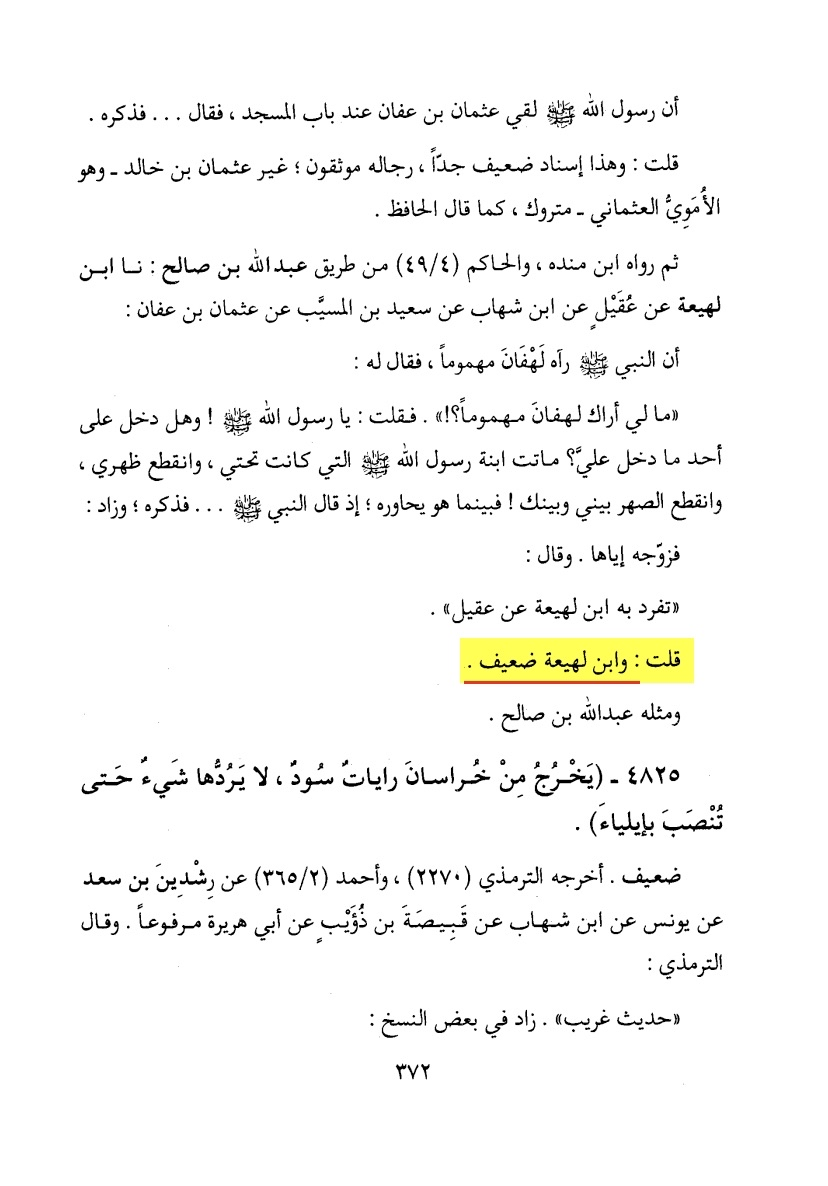 abu zur'ah and abu hatim both weaken him
abu zur'ah and abu hatim both weaken him
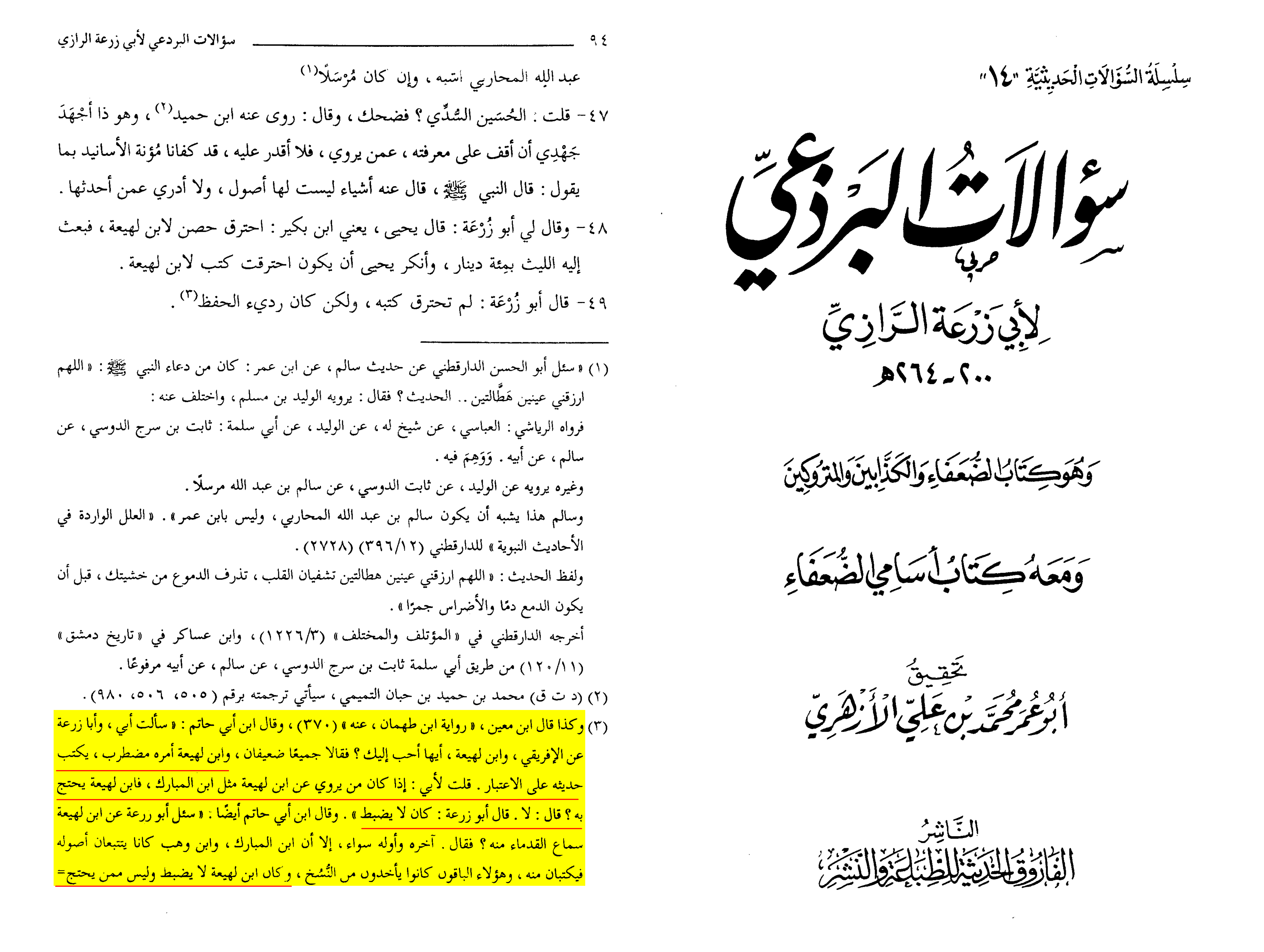 In conclusion, I believe the narration to be authentic due to the many paths from Asim which proves he didnt
make mistake when narrating this.
And even if u dont it dosent matter.
If you believe it is authentic then they were abrogated as shown from the statement of Ubay RA "RAISED AMONG
WHAT WAS RAISED" and what the classical scholars have said regarding this.
If you dont believe its authentic then the verses never existed.
This section is very similar to Stoning Verses as a narration can sometimes include the stoning verse and
surah al ahzab.
In conclusion, I believe the narration to be authentic due to the many paths from Asim which proves he didnt
make mistake when narrating this.
And even if u dont it dosent matter.
If you believe it is authentic then they were abrogated as shown from the statement of Ubay RA "RAISED AMONG
WHAT WAS RAISED" and what the classical scholars have said regarding this.
If you dont believe its authentic then the verses never existed.
This section is very similar to Stoning Verses as a narration can sometimes include the stoning verse and
surah al ahzab.
 Muhammad Bin tahur al Ashur in his books Tafseer al Tahreer wal tanweer
"From zirr, ubay asked me, how many verses do u count in surah al ahzab he (Zirr) said: 73 verses, Ubay
replied saying it used to be similar in length to Surah al Baqara and he recited the stoning verse and says
afterwards "IT WAS RAISED AMONG WHAT WAS RAISED" " Muhammad bin Tahur al ashur says raised meaning "abrogated"
And thr narration of Abu Ubayd al Qasim bin salam, and ibn Al Anbari with a chain from Aisha where she said:
"200 verses of Surah al Ahzab were recited during the lifetime of the Prophet Muhammad ﷺ, so when Uthman
standarised the masahif he could not (write more) then what it is now"
BOTH REPORTS ARE WEAK IN CHAIN
even if its not weak, both narrations illustrate abrogation.
As Muhammad bin Tahur says at the bottom of the page
"The report of Aisha is weaker in chain (than ubays) and if its authentic, then she was talking about abrogation
that occured in Surah al Ahzab"
Even if its not weak, both narrations illustrate abrogation
Aisha= "could not write more"
Ubay= "raised what was raised"
Muhammad Bin tahur al Ashur in his books Tafseer al Tahreer wal tanweer
"From zirr, ubay asked me, how many verses do u count in surah al ahzab he (Zirr) said: 73 verses, Ubay
replied saying it used to be similar in length to Surah al Baqara and he recited the stoning verse and says
afterwards "IT WAS RAISED AMONG WHAT WAS RAISED" " Muhammad bin Tahur al ashur says raised meaning "abrogated"
And thr narration of Abu Ubayd al Qasim bin salam, and ibn Al Anbari with a chain from Aisha where she said:
"200 verses of Surah al Ahzab were recited during the lifetime of the Prophet Muhammad ﷺ, so when Uthman
standarised the masahif he could not (write more) then what it is now"
BOTH REPORTS ARE WEAK IN CHAIN
even if its not weak, both narrations illustrate abrogation.
As Muhammad bin Tahur says at the bottom of the page
"The report of Aisha is weaker in chain (than ubays) and if its authentic, then she was talking about abrogation
that occured in Surah al Ahzab"
Even if its not weak, both narrations illustrate abrogation
Aisha= "could not write more"
Ubay= "raised what was raised"
 Imam Ahmad in his Musnad
narration #21206
Ubay asked zirr
"How many (ayat) do you recite in surah al ahzab, zirr said 70 (something) verses, Ubay replied:
I recited it with the prophet and it was similar to surah al baqara or larger than it and it had in Ayat al Rajm"
#21207
"From zirr, ubay asked me, how many verses do u count in surah al ahzab he (Zirr) said: 73 verses,
Ubay replied saying it used to be similar in length to Surah al Baqara and we recited in the stoning verse"
ubay then quotes it
First narration is weak due to Yazeed bin abi ziyad.
Ibn Main said: he is not needed
Ibn al mubarak said: throw him away
shuba said: he was honorouable
For more information on why yazeed bin ziyad is weak
Long Link
Second narration is weak due to Asim bin abi al najoud due to his weak memory in hadith
There is major ikhtilaf on Asim
You have others who authenticed this narration with him in the sanad and other who didnt.
For more information on Asim
Long Link
In all cases there are other narrations where it states "RAISED AMONG WHAT WAS RAISED" meaning it still alludes to abrogation.In all cases
there are other narrations where it states "RAISED AMONG WHAT WAS RAISED" meaning it still alludes to abrogation.
Imam Ahmad in his Musnad
narration #21206
Ubay asked zirr
"How many (ayat) do you recite in surah al ahzab, zirr said 70 (something) verses, Ubay replied:
I recited it with the prophet and it was similar to surah al baqara or larger than it and it had in Ayat al Rajm"
#21207
"From zirr, ubay asked me, how many verses do u count in surah al ahzab he (Zirr) said: 73 verses,
Ubay replied saying it used to be similar in length to Surah al Baqara and we recited in the stoning verse"
ubay then quotes it
First narration is weak due to Yazeed bin abi ziyad.
Ibn Main said: he is not needed
Ibn al mubarak said: throw him away
shuba said: he was honorouable
For more information on why yazeed bin ziyad is weak
Long Link
Second narration is weak due to Asim bin abi al najoud due to his weak memory in hadith
There is major ikhtilaf on Asim
You have others who authenticed this narration with him in the sanad and other who didnt.
For more information on Asim
Long Link
In all cases there are other narrations where it states "RAISED AMONG WHAT WAS RAISED" meaning it still alludes to abrogation.In all cases
there are other narrations where it states "RAISED AMONG WHAT WAS RAISED" meaning it still alludes to abrogation.
 You have others who authenticed this narration with him in the sanad and other who didnt.
Abd al malik Bin Abdullah Bin Duhaysh authenticates this narration which is the same one in Musnad Ahmad
So there is ikhtilaf on Asim.
Either way
1) If Asim is thiqah it still aludes to abrogtaion as in Musnad Abi dawud al Tailisi the narration states
"RAISED AMONG WHAT WAS RAISED"
2) If hes not reliable then the 200 verses never existed.
As well as Ubays way of speaking. He speaks in the past tense signifying that during his lifetime the verses
stopped being recited by the muslims, including the companions of the Prophet.
if hes not reliable then the 200 verses never existed.
Either choice works in our favour.
You have others who authenticed this narration with him in the sanad and other who didnt.
Abd al malik Bin Abdullah Bin Duhaysh authenticates this narration which is the same one in Musnad Ahmad
So there is ikhtilaf on Asim.
Either way
1) If Asim is thiqah it still aludes to abrogtaion as in Musnad Abi dawud al Tailisi the narration states
"RAISED AMONG WHAT WAS RAISED"
2) If hes not reliable then the 200 verses never existed.
As well as Ubays way of speaking. He speaks in the past tense signifying that during his lifetime the verses
stopped being recited by the muslims, including the companions of the Prophet.
if hes not reliable then the 200 verses never existed.
Either choice works in our favour.
 Here is the narration in Musnad Abi Dawud al Tailisi
Narrated by zirr bin hubyash
Ubayy bin Ka’b said to me; “How much of Surah Ahzab do you recite or how much do you count [its verses to be]?”
Zirr said that he replied, “so and so verses" Ubayy said; “It was similar to Surah Baqarah and we used to recite
in it, ‘Whenever an aged man or aged woman commit fornication stone them as a punishment from Allah and his
messenger'" So it was risen among what risen (abrogated verses being raised back to Allah)
Here is the narration in Musnad Abi Dawud al Tailisi
Narrated by zirr bin hubyash
Ubayy bin Ka’b said to me; “How much of Surah Ahzab do you recite or how much do you count [its verses to be]?”
Zirr said that he replied, “so and so verses" Ubayy said; “It was similar to Surah Baqarah and we used to recite
in it, ‘Whenever an aged man or aged woman commit fornication stone them as a punishment from Allah and his
messenger'" So it was risen among what risen (abrogated verses being raised back to Allah)
 ANOTHER SHUBHA
The narration states the following
Narrated by Abu Nuaym Al Fadl bin dukayn he said: "Yusuf narrated to us from Mujahid, he (Mujahid) said:
"Surah Al Ahzab was similar to Surah al Baqara or longer but on the day (the muslims fought musaylama al kathab,
the battle of yamama) alot of the Quran has gone"
ANOTHER SHUBHA
The narration states the following
Narrated by Abu Nuaym Al Fadl bin dukayn he said: "Yusuf narrated to us from Mujahid, he (Mujahid) said:
"Surah Al Ahzab was similar to Surah al Baqara or longer but on the day (the muslims fought musaylama al kathab,
the battle of yamama) alot of the Quran has gone"
 This report is disconnected in 2 ways.
1) Ibn Abdul Bar is narrating from Abu Nuaym.
Abu Nuaym died in 219 AH
Ibn Abdul Bar died in 463 AH at the age of 95.
463-95=368AH
Ibn Abdul Bar was born in 368AH
368AH-219AH=149.
Between Ibn Abdul Bars birth and Abu Nuayms death is 149 years apart.
Hence already making this report weak.
The 2nd way its diconnected
Mujahid is narrating the event of Yamama.
Mujahid was born in either 18AH, or 19AH, 20AH due to the fact he died at the age of 83 at the year 101AH,
102AH, or 103AH
Battle of Yamama took place at 11AH
In conclusion he never witnessed the event and never told us where he got his information.
1st way
This report is disconnected in 2 ways.
1) Ibn Abdul Bar is narrating from Abu Nuaym.
Abu Nuaym died in 219 AH
Ibn Abdul Bar died in 463 AH at the age of 95.
463-95=368AH
Ibn Abdul Bar was born in 368AH
368AH-219AH=149.
Between Ibn Abdul Bars birth and Abu Nuayms death is 149 years apart.
Hence already making this report weak.
The 2nd way its diconnected
Mujahid is narrating the event of Yamama.
Mujahid was born in either 18AH, or 19AH, 20AH due to the fact he died at the age of 83 at the year 101AH,
102AH, or 103AH
Battle of Yamama took place at 11AH
In conclusion he never witnessed the event and never told us where he got his information.
1st way
 2nd way
2nd way
 A.H years for Mujahid RA
A.H years for Mujahid RA
 When ibn abdul bar mentioned thisnarration in his books he included under the section of abrogation of the
recitation thats no longer in the Mushaf. He then proceeds to mention the concepts of abrogation and shows
narrations that allude to abrogation and on the next page, he included the narration of Mujahid.
When ibn abdul bar mentioned thisnarration in his books he included under the section of abrogation of the
recitation thats no longer in the Mushaf. He then proceeds to mention the concepts of abrogation and shows
narrations that allude to abrogation and on the next page, he included the narration of Mujahid.
 Al Suyuti is using Abu Ubayd as a source for this.
Abu Ubayd put this under the section of "what was raised (abrogated) from the Quran after
its revelation and its not proven in the Masahif
The Muhaqiqs quoted Al Qurtubi in the footnote and he stated:
Ubay was mentioning that this verse was abrogated from the Quran.
Al Suyuti is using Abu Ubayd as a source for this.
Abu Ubayd put this under the section of "what was raised (abrogated) from the Quran after
its revelation and its not proven in the Masahif
The Muhaqiqs quoted Al Qurtubi in the footnote and he stated:
Ubay was mentioning that this verse was abrogated from the Quran.
 Al Qutubi mentions the narrations and says
"The People of Knowlegde have agreed that Allah had raised (abrogated) verses from Al Ahzab and is no more
(or less) what is between our hands and that the stoning verse was raised in Tilawa.
Al Qurtubi agrees and says its about abrogation as well.
Al Qutubi mentions the narrations and says
"The People of Knowlegde have agreed that Allah had raised (abrogated) verses from Al Ahzab and is no more
(or less) what is between our hands and that the stoning verse was raised in Tilawa.
Al Qurtubi agrees and says its about abrogation as well.
 Ibn Kathir mentions the same narration and says that is Hassan sanad and it what was abrogated as well.
Ibn Kathir mentions the same narration and says that is Hassan sanad and it what was abrogated as well.
 Al Hafidh Al Mustaghfiri mentions the same narration and puts it under the section
"What was raised or abrogated after its revelation and its not in the Masahif"
Al Hafidh Al Mustaghfiri mentions the same narration and puts it under the section
"What was raised or abrogated after its revelation and its not in the Masahif"
 Ibn Hazm also agrees that the ayat were abrogated.
He also shows how there is many turuq from Asim narrating the same thing proving he didnt make a mistake
when narrating this.
Ibn Hazm also agrees that the ayat were abrogated.
He also shows how there is many turuq from Asim narrating the same thing proving he didnt make a mistake
when narrating this.
 In conclusion, I believe the narration to be authentic due to the many paths from Asim which proves
e didnt make mistake when narrating this.
And even if u dont it dosent matter.
If you believe it is authentic then they were abrogated as shown from the statement of Ubay RA "RAISED
MONG WHAT WAS RAISED" and what the classical scholars have said regarding this.
If you dont believe its authentic then the verses never existed.
This section is very similar to Stoning Verses as a narration can sometimes include the stoning verse
nd surah al ahzab.
Ibn Lahia being weak
imam al tirmidhi said hes weak according to the people of hadtih and quotes yahya ibn saeed weakening him aswell,
nasa'i said hes weak, and al daraqutni also said hes weak
In conclusion, I believe the narration to be authentic due to the many paths from Asim which proves
e didnt make mistake when narrating this.
And even if u dont it dosent matter.
If you believe it is authentic then they were abrogated as shown from the statement of Ubay RA "RAISED
MONG WHAT WAS RAISED" and what the classical scholars have said regarding this.
If you dont believe its authentic then the verses never existed.
This section is very similar to Stoning Verses as a narration can sometimes include the stoning verse
nd surah al ahzab.
Ibn Lahia being weak
imam al tirmidhi said hes weak according to the people of hadtih and quotes yahya ibn saeed weakening him aswell,
nasa'i said hes weak, and al daraqutni also said hes weak
 ibn rajab al hanbali also quotes al khatib al baghdadi saying that ibn lahia had many munkar reports due to his leniency
ibn rajab al hanbali also quotes al khatib al baghdadi saying that ibn lahia had many munkar reports due to his leniency
 imam al nawawi and al bayhaqi said the scholars of hadith are in agreement that he is weak and not invoked
imam al nawawi and al bayhaqi said the scholars of hadith are in agreement that he is weak and not invoked
 Scholar of Hadith Al-Albani رحمه الله weakens Ibn Lahi’a
Silsilat Al-Ahadith Al-Daifa Vol 10 and page 372
Scholar of Hadith Al-Albani رحمه الله weakens Ibn Lahi’a
Silsilat Al-Ahadith Al-Daifa Vol 10 and page 372

 abu zur'ah and abu hatim both weaken him
abu zur'ah and abu hatim both weaken him
 In conclusion, I believe the narration to be authentic due to the many paths from Asim which proves he didnt
make mistake when narrating this.
And even if u dont it dosent matter.
If you believe it is authentic then they were abrogated as shown from the statement of Ubay RA "RAISED AMONG
WHAT WAS RAISED" and what the classical scholars have said regarding this.
If you dont believe its authentic then the verses never existed.
This section is very similar to Stoning Verses as a narration can sometimes include the stoning verse and
surah al ahzab.
In conclusion, I believe the narration to be authentic due to the many paths from Asim which proves he didnt
make mistake when narrating this.
And even if u dont it dosent matter.
If you believe it is authentic then they were abrogated as shown from the statement of Ubay RA "RAISED AMONG
WHAT WAS RAISED" and what the classical scholars have said regarding this.
If you dont believe its authentic then the verses never existed.
This section is very similar to Stoning Verses as a narration can sometimes include the stoning verse and
surah al ahzab.